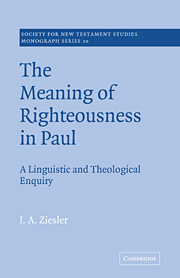Book contents
- Frontmatter
- Contents
- Preface
- Abbreviations
- Introduction
- 1 The Old Testament
- 2 Greek Usage of δíκαιος and cognates
- 3 Later Judaism I: the Septuagint
- 4 Later Judaism II: Intertestamental writings
- 5 Later Judaism III: Philo and Josephus
- 6 Later Judaism IV: The Rabbinic writings
- 7 The New Testament apart from the Pauline corpus
- 8 Paul: Philippians, Colossians, Thessalonians, Ephesians, the Pastorals, and Corinthians
- 9 Righteousness in Christ
- 10 Galatians
- 11 Romans
- Conclusion
- Appendix I Antonyms
- Appendix II The Apostolic Fathers
- Bibliography
- Index of passages cited
- Index of authors
Appendix II - The Apostolic Fathers
Published online by Cambridge University Press: 04 August 2010
- Frontmatter
- Contents
- Preface
- Abbreviations
- Introduction
- 1 The Old Testament
- 2 Greek Usage of δíκαιος and cognates
- 3 Later Judaism I: the Septuagint
- 4 Later Judaism II: Intertestamental writings
- 5 Later Judaism III: Philo and Josephus
- 6 Later Judaism IV: The Rabbinic writings
- 7 The New Testament apart from the Pauline corpus
- 8 Paul: Philippians, Colossians, Thessalonians, Ephesians, the Pastorals, and Corinthians
- 9 Righteousness in Christ
- 10 Galatians
- 11 Romans
- Conclusion
- Appendix I Antonyms
- Appendix II The Apostolic Fathers
- Bibliography
- Index of passages cited
- Index of authors
Summary
These writings are worth examining to discover what has happened both linguistically and theologically in the sub-Apostolic Church, although we cannot draw hasty conclusions from them. They may not only have used words differently, but also have misunderstood Paul. The term ‘Apostolic Fathers’ here covers: 1 and 2 Clement, Barnabas, the Didache, the Shepherd of Hermes, Diognetus, Ignatius, Polycarp to the Philippians, and the Martyrdom of Polycarp.
LINGUISTIC FACTS
Rather than go in detail through all the occurrences of δικαι- in the literature, we may select only those cases where there is some special interest. Thus, in the verb, while it means ‘acquit’ in the majority of cases, it 4 times means ‘make righteous’ (Barn. 15.7; HVis 3.9. 1; HMan. 5.1. 7; HSim. 5.7. 1) with a possible fifth (Diog. 9.5 – the problem of Diog. 9 is discussed below). The existence of this meaning may point to a development beyond Paul in a moralistic direction.
Whenever the noun is used of man, it is always for conduct in relation to God, and similarly the adjective is always in some sense ethical, with nearly always an explicit relation to God. The exceptions are: 1 Clem. 44.3 (adverb); HSim. 1.4 (adverb); Mart. 11.1. Thus, as in earlier literature, adjective and noun are used for behaviour in relationship – the behavioural note is never absent, and the relational seldom.
TEACHING ON JUSTIFICATION
That the Apostolic Fathers have small understanding of justification by faith has been shown by T. F. Torrance, The Doctrine of Grace in the Apostolic Fathers (Grand Rapids, 1959), 133–9 and passim.
- Type
- Chapter
- Information
- The Meaning of Righteousness in PaulA Linguistic and Theological Enquiry, pp. 214 - 216Publisher: Cambridge University PressPrint publication year: 1972

